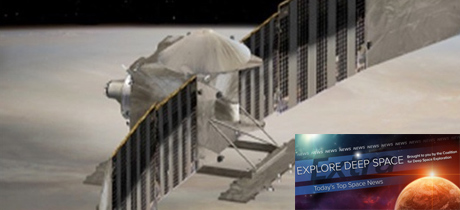In Today’s Deep Space Extra… NASA announced it is going to Venus. The agency plotted out its exploration and science goals yesterday at a State of NASA address.
Space Science
NASA selects two Venus missions for Discovery program
Coalition Member in the News – Lockheed Martin
SpaceNews.com (6/2): DAVINCI+ and VERITAS are two planetary science missions to Venus announced by NASA Administrator Bill Nelson on Wednesday. Part of NASA’s Discovery program, the spacecraft are expected to launch in the 2028-2030 timeframe and are the first missions the agency will send to Venus in over 30 years. DAVINCI+, or Deep Atmosphere Venus Investigation of Noble gases, Chemistry, and Imaging will study the atmosphere to measure elements that can provide information on how Venus’ runaway greenhouse effect developed. VERITAS, or Venus Emissivity, Radio Science, InSAR, Topography and Spectroscopy will map Venus’ surface to determine the planet’s geologic history and understand why it developed so differently than Earth. Lockheed Martin will build the spacecraft for both missions.
Satellites may have been underestimating the planet’s warming for decades
Space.com (6/2): A reassessment of satellite data by a Lawrence Livermore National Laboratory researcher suggests that past data has underestimated the effects of climate change. The issue is an underestimation of the warming of the lower levels of the atmosphere.
Other News
Bill Nelson lays out lofty space exploration goals in first NASA address
Coalition Member in the News – Boeing
Floridapolitics.com (6/2): In a “State of NASA” address on Wednesday, new NASA Administrator Bill Nelson spoke about the agency’s priorities under his watch, including Artemis I, the first launch of the Space Launch System (SLS) with an unpiloted Orion spacecraft for a test flight around the Moon planned for late this year; launch of the James Webb Space Telescope (JWST), also later this year; the exploration of Mars by the Perseverance rover and a rising emphasis on Earth science and climate change as well as returning humans to the Moon to prepare for expeditions to Mars.
Axiom Space purchases three Crew Dragon missions
Coalition Member in the News – Axiom Space
SpaceNews.com (6/2): Axiom Space, the Houston-based commercial human space flight company, announced an agreement on Wednesday with SpaceX expanding the number of private astronaut launches to the International Space Station (ISS) it has planned. The companies did not disclose the terms of the agreement.
NASA is launching tardigrades and baby squid into space
Smithsonianmag.com (6/3): NASA is launching 5,000 tardigrades and 128 baby bobtail squid to the International Space Station (ISS) to help scientists understand the impacts of space travel on the human body. Tardigrades are resilient, and researchers hope they may be able to identify genetic changes occurring in the animals as they hurtle through space that have something to do with how the creatures adapt to their new environment. Because the baby squid glow in the dark, researchers can see how their bodies interact with microbes and use that as a window into how being outside the Earth’s atmosphere might impact the microbes in the human gut. The tardigrades and squid are launching in today’s cargo resupply mission to the ISS.
NASA’s Perseverance rover is the 1st spacecraft in years to carry fresh U.S. plutonium. It won’t be the last.
Space.com (6/2): In addition to its groundbreaking exploration of Mars, NASA’s Perseverance rover represents the first U.S. mission since the end of the Cold War to carry domestic, fresh radioactive plutonium as a source of power. Perseverance will not be the last to launch with domestic plutonium, a resource vital to plans for launching planetary science missions to destinations too far to rely on solar power. NASA’s next plutonium-powered spacecraft will be Dragonfly, launching in 2027 to Saturn’s moon Titan, which receives about 1% of the sunlight that Earth does.

